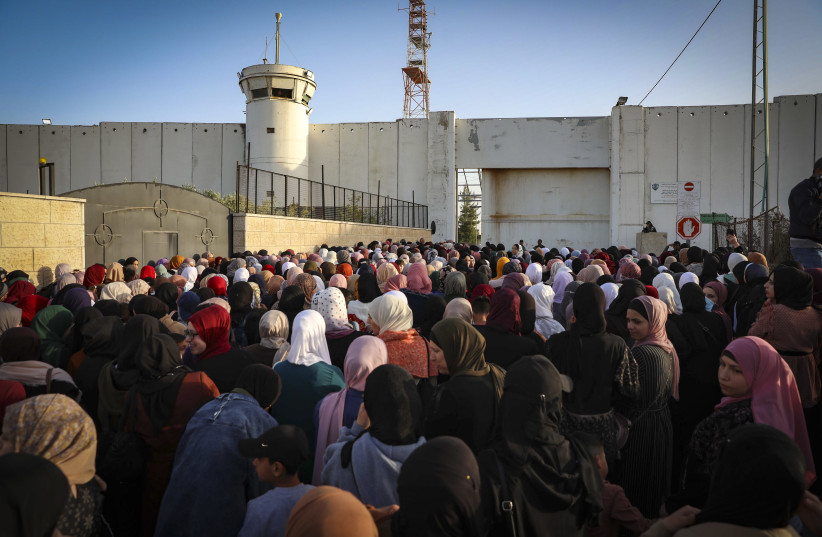The US is concerned by new “onerous” IDF regulations that could restrict foreign visits to Palestinian territories, scheduled to go into effect on October 20.
“We remain concerned about the potential for these policies to reduce foreign travelers, volunteers, academics, students and investors in the West Bank,” a senior US Embassy official in Jerusalem told reporters on Sunday.
“We will continue to work with the Israeli government on this,” she said. “We have been very clear about our concerns all along, and we will continue to do so,” she added.
"We have been very clear about our concerns all along and we will continue to do so."
US embassy official
What are the regulations for visiting Palestinians in the West Bank?

The Israeli government has clarified that the regulations are part of a two-year pilot program and that elements of it can be changed during that period, she said.
The 90-page set of restrictions published on Sunday replaces three pages of vague regulations that allowed for what appeared to be an arbitrary visa process for foreigners wanting to visit the West Bank.
The office of the Coordinator for Government Activities in the Territories decided to clarify its visa policy after the Israeli left-wing, nongovernmental group HaMoked challenged its three-page policy by filing multiple petitions to the High Court of Justice.
But the clarification created the appearance of a burdensome process, which some feared could limit foreign engagement with Palestinians in the West Bank.
What are the issues Palestinians are facing?
At issue is also family unification in situations where foreigners are married to Palestinians in the West Bank but have not been granted residency status, particularly given that Israel has restricted the number of Palestinians who can be given such status.
The new restrictions do not apply to Israelis and or those heading to West Bank settlements. They are intended solely for those whose destination is Palestinian areas of the West Bank.
Although the regulations streamline West Bank exit and entry for some Palestinians, in many cases it limits the time frame most foreigners can stay in the West Bank. It also creates a “cooling-off period,” mandating that foreigners can only reapply or receive another visa if they leave for a set period.
Why are some opposed to it?
Opponents of the new guidelines are concerned that such restrictions will make it difficult for academics and entrepreneurs to develop long-term projects with Palestinians.
Over the weekend, the foreign media picked up on one of the many restrictions in the draft guidelines published in February. Those guidelines requested that foreigners who wanted to extend their visas due to a new romantic involvement with a Palestinian must have already notified COGAT of the relationship within 30 days of its inception.
The way it was set out, the guidelines made it seem as if foreigners in a new romantic relationship with Palestinians must notify COGAT within 30 days.
Under the new September guidelines, foreigners must notify COGAT of the relationship if they want to extend their visas.
“These less onerous requirements are definitely a change from the original publication in February, that we welcome,” the US official said.
Other positive changes included extended visa options for visitors and spouses of up to 180 days rather than 90 days and larger quotas for the number of distinguished researchers and students who could visit the West Bank, she said.
But there are still other changes that need to be made, including the process by which COGAT reviews academic appointments to Palestinian educational institutions, the US official said.
It is important to empower Palestinian development in the West Bank and not have regulations that limit this, she said, adding that it was important that foreigners, including American citizens, receive “fair and equal treatment” and that the visa process is transparent.
Working in tandem with the Israeli government on these guidelines, the Biden administration was engaged with Israeli officials on a visa waiver program for Israeli visitors to the US, the US official said.
This includes extending “reciprocal privileges to all US citizens, including Palestinian Americans, and we have been pretty clear about what we expect vis-à-vis visa reciprocity,” she said. “But these are parallel but separate tracks.”
US Ambassador to Israel Tom Nides said "I fully expect the Government of Israel to make necessary adjustments during the pilot period to ensure transparency as well as the fair and equal treatment of all US citizens and other foreign nationals traveling to the West Bank."
He explained that he had 'aggressively engaged with the Government of Israel on these draft rules – and we will continue to do so in the 45-day lead up to implementation and during the two-year pilot period."
Nides added that he "continued to have concerns" particularly in regard to "COGAT’s role in determining whether individuals invited by Palestinian academic institutions are qualified to enter the West Bank, and the potential negative impact on family unity.
'It is important to ensure all of these regulations are developed in coordination with key stakeholders, including the Palestinian Authority."
